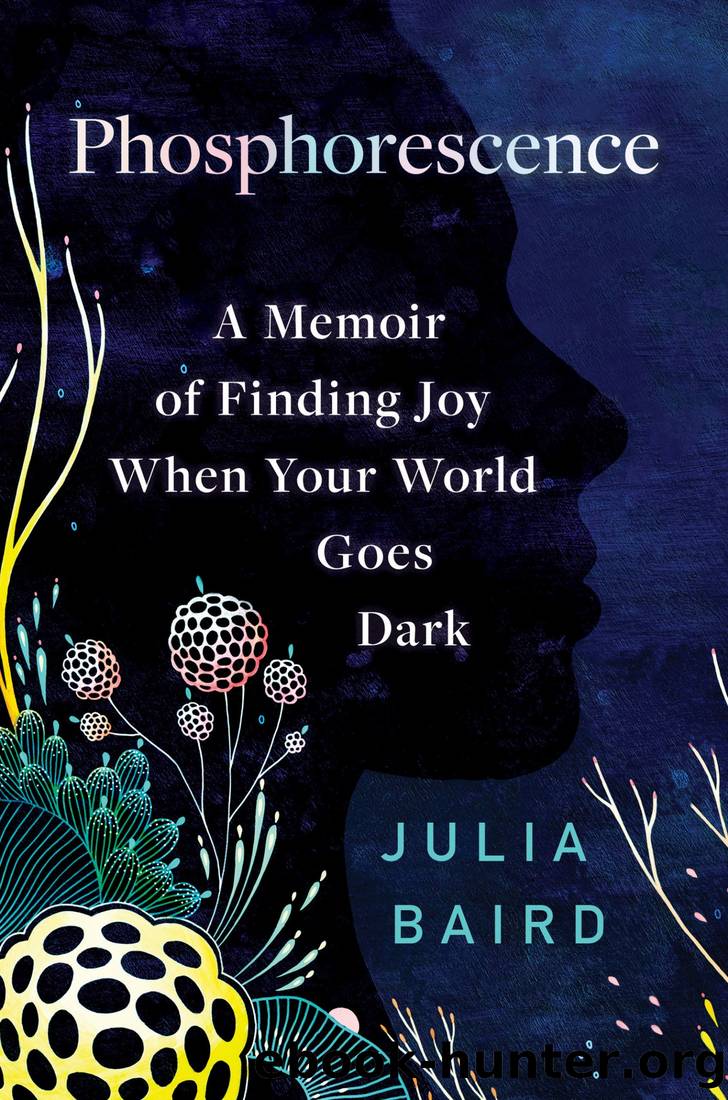Phosphorescence: A Memoir of Finding Joy When the World Goes Dark by Julia Baird

Author:Julia Baird [Baird, Julia]
Language: eng
Format: epub
Tags: Medical, Internal Medicine
ISBN: 9780593236918
Google: CwQyEAAAQBAJ
Publisher: Random House
Published: 2021-11-15T00:17:48.778523+00:00
* * *
⢠⢠â¢
Buddhists call it muditaâa delight in anotherâs good fortune, or an unselfish joy. The Yiddish word nachas has a similar meaning of pride in someone elseâs accomplishments, usually referring to oneâs children. Another slightly different but rarely used word with a similar meaning is âconfelicityââpleasure in anotherâs happiness. In recent years, psychologists studying this concept have coined the term âfreudenfreudeâ to describe the opposite of schadenfreude, and it means genuine rejoicing in anotherâs success. I am not sure why we allow freudenfreude to be permanently overshadowed by its evil twin schadenfreude when it is equally useful as a word and a far superior emotion. Psychologists have found that freudenfreude is actually an effective bulwark against melancholia or sadnessâa simple way, in other words, to get out of your own head and bask in borrowed sun.
Gore Vidal was wrong: Itâs not the success of our friends that is bad for us, but not relishing it. There is some evidence that a lack of freudenfreude can actually make you depressed. Experiencing it is something we need to work on; itâs an attitude, or a habit of thinking, that we need to coax our minds into. We encourage people to feel compassion for those who struggle, so why not also encourage freudenfreude for those who triumph? Itâs the antidote to envy.
Psychology professor Catherine Chambliss has been studying freudenfreude for years. She conducted an experiment with severely mentally ill people in a residential psychiatric facility to try to establish if managing competitive impulses and friendship could help stem depression in a clinical setting. She and her colleagues spent time with staff and patients talking about how to consciously, deliberately, and genuinely celebrate the successes of other people, in what they called âFreudenfreude Enhancement Techniques.â In her book Empathy Rules: Depression, Schadenfreude, and Freudenfreude, Chambliss writes that, while the strategy did not provide âa miracle cure,â there were some startling results. For example, there was a âdiscernible positive influence on morale,â the number of incidents of assault and self-injury declined, and the number of successful discharges âincreased dramatically.â Professor Chambliss concludes: âEmpathy works wonders. Failures of empathy can be a big problem. Failing to respond with empathy to a friendâs success or setback may prove toxic to relationships, undermining oneâs social support and possibly leading to social isolation and the depression it all too often produces.â
In 2016, Professor Chambliss replicated her findings in a study in Europe, which found that students and hospital patients with depression had higher levels of schadenfreude and lower levels of freudenfreude. She and her co-author admitted that they did not know if these differences âmight contribute to the development of depression, be a consequence of it, or both.â At any rate, the connection makes sense.
The best part of any reality TV singing show is very often the family and friends backstage, screaming and hopping like rabbits when their candidate wins. Itâs the same at any sporting event, from the Olympics to local athletics carnivals,
Download
This site does not store any files on its server. We only index and link to content provided by other sites. Please contact the content providers to delete copyright contents if any and email us, we'll remove relevant links or contents immediately.
Machine Learning at Scale with H2O by Gregory Keys | David Whiting(4292)
Never by Ken Follett(3937)
Harry Potter and the Goblet Of Fire by J.K. Rowling(3848)
Unfinished: A Memoir by Priyanka Chopra Jonas(3381)
Fairy Tale by Stephen King(3370)
The Man Who Died Twice by Richard Osman(3072)
Will by Will Smith(2908)
Rationality by Steven Pinker(2352)
It Starts With Us (It Ends with Us #2) by Colleen Hoover(2341)
Can't Hurt Me: Master Your Mind and Defy the Odds - Clean Edition by David Goggins(2323)
The Dark Hours by Michael Connelly(2300)
The Storyteller by Dave Grohl(2228)
Friends, Lovers, and the Big Terrible Thing by Matthew Perry(2219)
The Dawn of Everything: A New History of Humanity by David Graeber & David Wengrow(2196)
The Becoming by Nora Roberts(2188)
The Stranger in the Lifeboat by Mitch Albom(2113)
Cloud Cuckoo Land by Anthony Doerr(2098)
Love on the Brain by Ali Hazelwood(2060)
Einstein: His Life and Universe by Walter Isaacson(2010)
